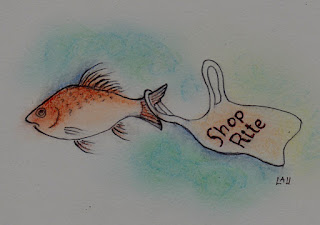When the first factory-made
men’s shirts arrived from America to Quito, Ecuador in the late 1950s, they came
in clear plastic bags. I don’t know which of my classmates first realized the
potential of the bags as ultra-modern, super-cool book carriers, but when she
showed up in school with her books neatly encased in one of those bags, we all
longed for the day when we too could discard our hand-tooled leather satchels
and replace them with plastic bags.
When my mother finally bought
one of those shirts, she let me have the bag. I remember carefully sliding my
books and notebooks into it, and admiring the effect of my school things neatly
contained by a material that, like Cinderella’s glass slipper, simultaneously protected
and revealed them.
But my plastic bag was as
fragile as the glass slipper, and after a while the corners of my books made
holes in it. I didn’t much care, however, because by then my parents and I were
packing our suitcases for our new home in the land of plastic, America.
Before those bags, for the
first thirteen years of my life, in Spain and later in Ecuador, I had lived a
plastic-free existence. The objects that surrounded me were made of wood,
metal, glass, stone, wool, cotton, clay, paper, straw, rubber, or celluloid.
Other than paper, very little
was ever thrown away, and objects like the red clay pan in which the maid
washed the dishes, or the long bag of unbleached cotton in which she brought
the bread home from the bakery, had been around since before my birth, and I
thought of them as sort of second-class members of the family.
Other than as containers for
dried flower arrangements, who uses baskets anymore? But all through my
childhood the eggs, almonds, cherries and sausages that my grandmother shipped to
Barcelona weekly from her farm came by train in a deep two-handled wicker
basket covered with burlap, and both basket and burlap were piously preserved
and returned to her by that same train.
When my mother went to the
fish market she carried a flatter basket, its handle looped over her arm. I had
a basket of my own, a smaller version of my mother’s.
I loved the fishwives, goddesses
who sat enthroned above their displays, wearing blood-spattered white aprons
decorated with broad bands of lace.
Fish of all sizes and colors,
squid, octopuses, mussels and clams were arranged mandala-like on round wicker
trays, and gleamed as brightly as the rose window of a gothic cathedral. After my
mother had made her choice, the peixatera
would wrap up for me a single iridescent blue sardine, to carry home in my own little
basket.
The Mediterranean of my childhood
was crammed with fish, one of the few reliable bounties in those hardscrabble,
post-civil war years. Now it, like the rest of the waters on the planet, is
having the life choked out of it by millions of tons of plastic—fish-ensnaring,
habitat-poisoning, indestructible plastic, most of it in the form of plastic
bags.
The plastic bags that had
seemed so rare and precious to my schoolmates and me in 1958 have become the banner
of environmental destruction. Things must change, and soon. In the words of
Joanna Macy, “While the agricultural revolution took centuries, and the
industrial revolution took generations, this ecological revolution has to
happen within a matter of a few years.” (quoted by Richard Rohr)
The scope of the disaster is
so enormous that I often want to just give up. But if optimism is the only
moral choice, then I must act as if my efforts count. So in my own small battle
for the survival of the planet, I keep my flag—a well-worn New Yorker canvas
bag—in the back of the car, and proudly fly it when I walk into a store.


